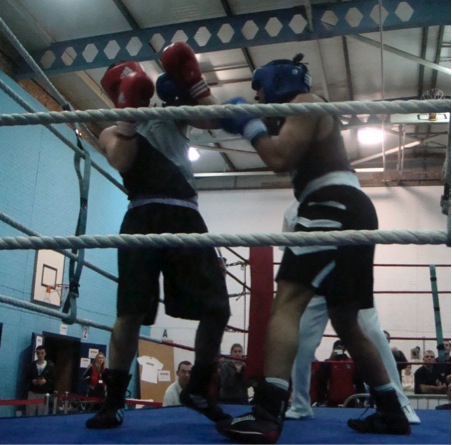By Dr Stan Baltsezak
The UK trainee perspective (The BJSM blog features the trainee perspective every two weeks)*

February, March and April are the months when British Universities & Colleges Sport (BUCS) championships take place. Students from all over the UK compete in numerous contact and non-contact sports.
The Championships and Games provide a unique opportunity for budding SEM doctors to learn the rules of the sports, observe elements of coach-athlete interaction and gain experience looking after different sports as an event doctor. All necessary equipment is provided by BUCS so all you need to bring is your skills and a keen interest in sport.
Being a doctor at the pitch side, pool side or ring side allows you to observe the mechanism of injury and assess the injury minutes after it’s happened. It is somewhat different to when we see patients in emergency departments or trauma clinics.
I was a ring side doctor at the Boxing competition in February 2012. A boxing doctor’s job is very hands on and can be divided into two parts:
1) Providing pre-bout medical examination (that may mean performing around 60 examinations before competition starts); within a limited timeframe you need to assess most of the important organ systems to make sure that the boxer is fit to fight
2) Being at the ring side, ready to respond to any knock out (KO) that may happen during the fight.
Knowledge of Amateur Boxing Association (ABA) rules is crucial during pre-fight medicals e.g. boxers cannot wear soft/hard contact lenses during the fight. I came across 3 students who were going to box with lenses on. Restrictions limit the competition of boxers whose visual acuity falls below 6/12 in their best eye. The question that had to be answered is: can you convert contact lens prescription into visual acuity?
Knowing rules and regulations is also important during bouts since a doctor can and may need to stop the fight on medical grounds.
All junior docs and medical students who want to experience sports medicine will be welcomed to volunteer and/or shadow other doctors during BUCS competitions. Those who are interested to take part in future events should contact BUCS Chief Medical Officer.
Useful web sites:
Dr Stan Baltsezak is a Specialty Registrar in Sport and Exercise Medicine. He works with GB men’s water polo squad, Paralympic Archery, and Manchester City FC reserve and academy teams.
Dr James Thing co-ordinates “Sport and Exercise Medicine: The UK trainee perspective” which runs every two weeks.